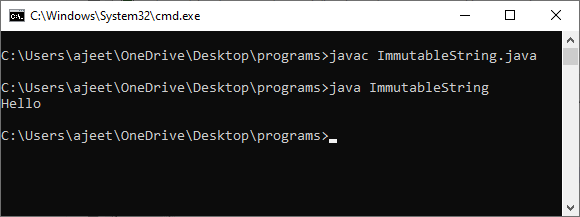What Is Unalterable Strings and Exactly How It Works
In the realm of shows, comprehending the concept of immutable strings is vital for developing protected and durable applications. Unalterable strings refer to strings that can not be altered after they are produced, making sure data honesty and predictability within the code.
The Essentials of Immutable Strings
Unalterable strings, as an essential concept in shows, are personality series that can not be altered once they are produced. This suggests that as soon as a string is assigned a value, that worth can not be altered. In languages like Python and Java, strings are immutable items, bring about various effects in regards to memory administration and information stability.
One of the vital advantages of immutable strings is that they offer a feeling of security in information manipulation. Since the content of an unalterable string can not be changed, it makes certain that the original information remains undamaged, decreasing the threat of unintentional adjustments during program implementation (Why are strings immutable in Java?). This home additionally simplifies debugging procedures, as designers can rely on that as soon as a string is defined, its worth will not be inadvertently modified
When a new string is created based on an existing one, instead than changing the initial string, the brand-new worth is stored separately. Overall, understanding the fundamentals of unalterable strings is crucial for understanding shows concepts and maximizing code performance.
Benefits of Unalterable Strings
Building upon the protection and efficiency benefits of unalterable strings, their benefits reach improving code reliability and simplifying simultaneous programs jobs. By being unalterable, strings can not be modified after development, which eliminates the risk of unexpected changes in the data they store. This inherent immutability makes certain that as soon as a string is developed, its worth stays consistent throughout the program's execution, decreasing the possibilities of insects caused by unanticipated modifications.
Additionally, immutable strings add to code integrity by making it much easier to reason regarding the state of a program. Considering that strings can not be changed, programmers can trust that a string will constantly hold the exact same value, streamlining debugging and maintenance efforts. This predictability causes extra secure and reputable codebases.

Implementation in Programming Languages
Within different programs languages, the incorporation of unalterable strings is a fundamental aspect that affects how information is dealt with and adjusted within code frameworks. The implementation of unalterable strings varies throughout different shows languages, with each language using its very own devices to sustain this principle.
On the other hand, languages like C and C++ do not have integrated assistance for immutable strings. Programmers in these languages should by hand apply immutability by implementing regulations within their code to avoid direct modifications to string things.
Best Practices for Functioning With Immutable Strings
When dealing with unalterable strings in programs languages like Java and Python, sticking to ideal methods ensures safe and additional reading effective data adjustment. Among the key best practices is to make use of StringBuilder or StringBuffer as opposed to directly adjusting strings, particularly when managing considerable concatenation procedures. These courses offer mutable alternatives for string control, assisting to avoid unnecessary memory appropriations and boosting efficiency.
Another best practice is to utilize string interpolation or format functions supplied by the language as opposed to hands-on concatenation. This not only enhances readability however additionally help in protecting against typical pitfalls such as unintentional string modifications. Furthermore, when collaborating with sensitive information such as passwords or API tricks, it is important to stay clear of storing them as simple text in immutable strings. Using safe and secure storage systems like char ranges or specialized libraries for taking care of delicate information assists mitigate safety and security dangers associated with unalterable strings.
Real-world Applications and Instances
Checking out functional implementations of unalterable strings in various markets exposes their substantial effect on information stability and system integrity. In the healthcare sector, unalterable strings play a critical duty in guaranteeing the safety and discretion of this patient information. By avoiding unapproved modifications to delicate information such as clinical records and prescriptions, unalterable strings aid preserve conformity with strict privacy laws like HIPAA.
Banks likewise gain from the immutable nature of strings to improve the protection of consumer information and purchase documents. Immutable strings aid prevent fraudulence and unauthorized alterations to monetary information, supplying a durable defense against cyber risks and making certain the trust and confidence of customers.

Verdict
To conclude, unalterable strings are fixed and stable series of personalities that use advantages such as string safety and security and improved efficiency in shows. They are applied in different programs languages see this here to guarantee information stability and protection. Best techniques for dealing with immutable strings consist of avoiding straight modifications and using methods that return new string objects. Real-world applications of immutable strings include information security, caching, and string adjustment tasks.
Immutable strings refer to strings that can not be changed after they are created, making sure information stability and predictability within the code. When a new string is created based on an existing one, rather than changing the original string, the new value is stored individually.In languages like Java and Python, strings are immutable by default, implying that once a string things is created, its worth can not be transformed - Why are strings immutable in Java?. Best techniques for working with unalterable strings consist of staying clear of direct alterations and utilizing methods that return brand-new string things. Real-world applications of unalterable strings include information security, caching, and string adjustment tasks